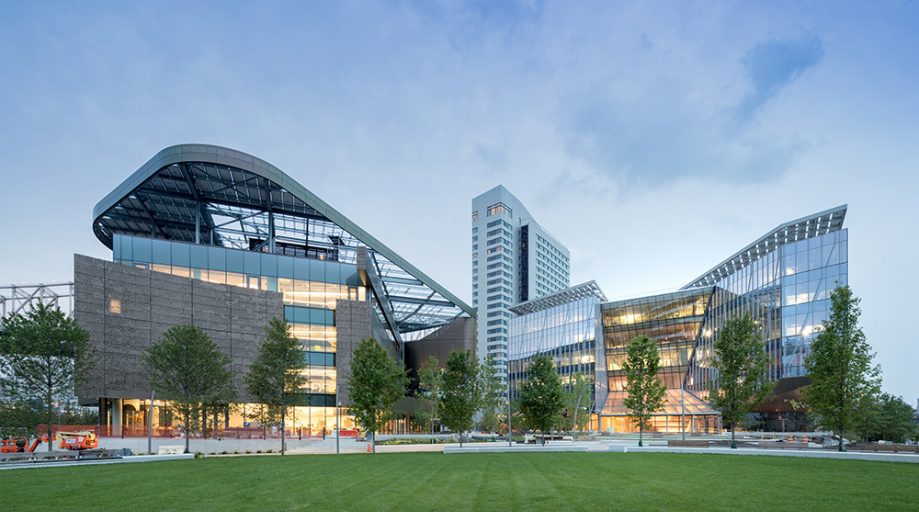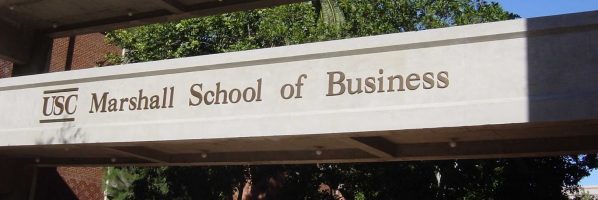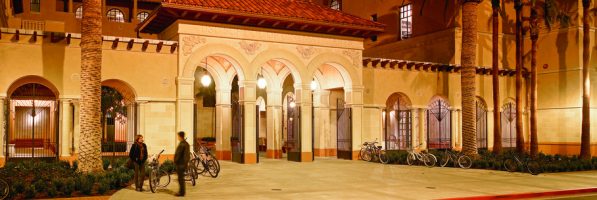Gear Up For These January MBA Deadlines

The next round of MBA admissions is swiftly approaching, with the eve of 2018 almost here. Time to mark those calendars!
New York City
The NYU Stern School of Business, Columbia Business School, and Rutgers Business School, Newark/New Brunswick are the big headliners when it comes to deadlines in the New York City metro in January.
The Forham University Gabelli School of Business, and the Syracuse University Whitman School of Management Online MBA program also have deadlines in the first weeks of the new year. Click here for more information on upcoming New York City metro deadlines.

The third round for application deadlines to Cornell’s Tech MBA on its new Roosevelt Island campus arrives January 10, 2018.
Los Angeles
The biggest Los Angeles metro business school institutions all have a slew of deadlines ready to pass within the first weeks of the new year, including the UCLA Anderson School of Management‘s full-time MBA, USC Marshall‘s part-time program, as well as the Claremont University Peter F. Drucker and Masatoshi Ito Graduate School of Management‘s part-time MBA.
Take a look at the coming deadlines in the Los Angeles metro here.
Toronto
Two Toronto metro schools have deadlines in early January, with the Ivey Business School full-time, Accelerated, and EMBA deadlines all falling on January 8, 2018. The second round deadline to the University of Toronto Rotman School of Management‘s full-time MBA also falls on January 8.
Take a look at the coming deadlines in the Toronto metro here.
Chicago
Two of the most prominent business schools in the entire Chicago metro—Chicago Booth and Northwestern Kellogg—feature a bevy of full-time, part-time, and Evening MBA deadlines before January 10. As well, the Quinlan School of Business at Loyola University’s full-time MBA for its annual spring intake arrives on January 15, 2018.
Just outside of the city, on the near border of Indiana, the Notre Dame Mendoza College of Business’ second round deadline for its full-time MBA program is set for January 9.
Get familiar with the coming deadlines in the Chicago metro here.

The second round of deadlines for the Northwestern Kellogg part-time and full-time MBA programs arrives on Jan. 10, 2018.
Boston
In Boston, the heart of America’s higher education, every January is a major month for several of the country’s most prominent MBA programs. Indeed, Harvard Business School and MIT Sloan, as well as the Questrom School of Business at Boston University, the Carroll School of Management at Boston College, and Northeastern University’s D’Amore-McKim School of Business all have MBA deadlines right at the beginning of the new year for various MBA programs.
Take a look at the coming deadlines in the Boston metro here.
For updated deadline information in Philadelphia, Washington DC, Baltimore, Atlanta, Dallas, Houston, Denver, San Francisco, San Diego, Seattle, and London, click here.
USC and Marshall School of Business Lead Way For IoT Systems

The USC Institute for Communication Technology Management (CTM), the USC Center for Cyber-Physical Systems and the Internet of Things (CCI), and the USC Integrated Media Systems Center (IMSC) recently announced a partnership that will design, develop, test, and implement an Internet-of-Things (IoT) system to benefit communities in the Los Angeles metro.
You may be wondering: what is an IoT? These networks are built from groups of independent people or organizations that voluntarily work together to create consolidated data streams from numerous IoT device owners into one common flow. Moving forward, IoTs will allow those connected to a network to share the data from their devices so it can be used for applications that manage energy use, transit, garbage collection, air quality, parking, or leak detection in pipes.
In a simpler form, IoT is short-hand for multiple devices beyond just computers and smartphones, that are interconnected.
The Intelligent Internet of Things Integrator consortium—or I3 for short—will engage governmental agencies and industry partners to encourage the development of community-based IoT networks. According to a press release, the system will provide greater transparency between the developers who use data for decision-making purposes and the users or organizations that own the devices connected to IoT networks.
Spearheaded by USC, the I3 consortium aims to improve decision-making and customer service at municipal levels. For example, I3 applications bay include guides for firefighters in burning buildings, or detailed insights to improve economic activity such as the foot traffic outside of a potential restaurant venue.
“We live in an age of data-driven innovation, and initiatives such as the I3 Consortium are essential to leveraging the data that surrounds us for a strong future,” said USC Marshall School of Business Dean James G. Ellis. “USC and Marshall will continue to lead the way in helping our students, faculty and community better understand the convergences between businesses, consumers and governments that will shape cities in this age of data.”
Ultimately, the system aims to turn consumers into entrepreneurs and I3 co-founders Bhaskar Krishnamachari, Jerry Power, and Cyrus Shahabi hope to distribute the technology as opensource software so other municipalities, states, and other government entities can benefit from USC’s system.
Showdown: Find Out if You Should Get an MBA in New York City or Los Angeles

The battle for hip-hop supremacy may have ended in the ’90s, but we can keep the East Coast-West Coast beef alive while looking at full-time MBA programs in New York City and Los Angeles.
Both cities are home to top business schools and are ripe with employment opportunities in booming industries. But which is best for you? Let’s take a deeper dive.
Location
We’ll start with location, location, location.
The most bustling city in the country, NYC is is the capital of the business world. More Fortune 500 companies are headquartered here than in any other city. The city is not only home to Wall Street and the world’s largest financial institutions, but also some of the largest media, marketing, and advertising companies. While New York City can be daunting in its size, it’s also furiously expensive to live in, so it may not be for everyone. Getting to know the city’s vast public transportation system is a must and it can get pretty cold in the winter, so if you’re looking for beaches, keep reading.
Meanwhile, LA is Tinseltown. The city’s economy is driven by entertainment industries like television, film, video games, music recording, and production, but also by international trade, technology, petroleum, fashion, apparel, finance, telecommunications, and tourism. In the 2017 Global Financial Centres Index, Los Angeles was ranked as having the 19th most competitive financial center in the world, and sixth most competitive in United States. The city is also the largest manufacturing center in the western United States, with the ports of Los Angeles and Long Beach comprising the fifth-busiest port in the world and a vital trade route within the Pacific Rim.
New York City Full-Time MBA Programs
Full-time MBA Programs in New York City include:
- Stern School of Business – New York University
- Gabelli School of Business – Fordham University
- Columbia Business School
- Zicklin School of Business – Baruch College
What stands out about these programs?
A Columbia MBA opens up countless career options and is sure to pay off in the long run: The average starting salaries for Columbia MBAs is $104,000, with 37 percent of full-time MBA of graduates being employed in the financial services industry.
Meanwhile, Stern’s MBA curriculum gives students tons of flexibility, and allows degree seekers to choose one or two MBA specializations, NYU allows up to three specializations from 20 plus options.
Both Gabelli and Zicklin’s full-time programs feature cohort-based structures. Gabelli’s program features a New York immersion experience where, over the course of five days, students are exposed to a number of company visits with corporations like Deutsche Bank, Money.net, and Hewlett Packard. As an alternative to completing a major, Zicklin students may pursue a joint JD/MBA in conjunction with Brooklyn Law School or New York Law School.
Los Angeles Full-Time MBA Programs
Full-time MBA Programs in Los Angeles include:
- Anderson School of Management – UCLA
- Argyros School of Business – Chapman University
- Graziadio School of Business and Management – Pepperdine University
- Marshall School of Business – USC
- Peter F. Drucker and Masatoshi Ito Graduate School of Management – Claremont Graduate University
What’s special about these MBA programs?
Anderson features a Business Creation Option for MBAs, which gives students the chance to start their own businesses while still in school. Meanwhile, the Special Project Option challenges groups to tackle problematic issues that impact an entire industry.
Chapman’s full-time MBA curriculum features three main components—core/required courses, a capstone course, and elective courses. Students have several track options available to concentrate their studies, including: Corporate Finance, Marketing, Investment Management, Entrepreneurship, Information Systems in Digital Times, and more.
Graziadio full-time MBA students have the option to spend a trimester abroad in the fall term of their second year at one of Pepperdine’s partner universities in Africa, Asia, Europe, Latin America, or Oceania.
USC MBAs have required study-away coursework called PRIME International Experiential Learning, a 10-day site visit overseas. Students must complete industry—and company-oriented recommendations in capstone projects that incorporate concepts from global strategy and global economics.
At the Drucker School, students may choose two areas of concentration to focus their studies, and select elective within these areas of concentration. Concentrations are offered in: Strategy, Finance, Marketing, Leadership, Global Management, and Information Technology Management.
Jobs and Salary
When it comes to job placement, both New York and Los Angeles have their perks.
New York is home to business school with the highest job placement rate: Around 97 percent of Columbia Business School graduates receive offers within three months of graduation. The school’s class of 2016 boasted an average starting salary of roughly $125,000 plus a $25,000 signing bonus. The top three industries that employ Columbia graduates are financial Services (37 percent), consulting (35 percent) and technology/media (10 percent).
Check out a complete breakdown of NYC salaries and employment opportunities, give our guide to getting paid in New York a read.
While Silicon Valley has a reputation for being the prime place for MBA jobs in California, LA has been catching up recently—and fast. Los Angeles has embraced the tech boom in a big way, with many Valley bigwigs and new startups alike moving their operations to Silicon Beach. With that in mind, the new era of LA innovation is creating some lofty starting salaries, particularly for MBA graduates.
Recent UCLA Anderson graduates earned an average starting salary of $121,250 with a $25,000 signing bonus, according to statistics released by the school. The top five industries to employ Anderson MBAs are in tech (30.6 percent), financial services (21.6 percent), consumer products (13.4 percent), and consulting services (13.4 percent).
Check out our guide to the highest MBA salaries in Los Angeles for more information.
USC Marshall Alumni Honored by Southern California Leadership Network

USC Marshall School of Business graduate Darin Chidsey was recognized at the Southern California Leadership Network Visionaries Awards gala last month. Alumni of the Southern California Leadership Network’s (SCLN) fellowship program were honored at the event.
Chidsey earned his MBA in 2011 and twice graduated from the SCLA fellowship program, having completed the Leadership Southern California fellowship in 2008 and the California Connections fellowship in 2012.
“It is a great honor to be recognized alongside some of the region’s most admirable innovators and role models,” Chidsey said. “SCLN’s fellowship programs have been instrumental in developing a strong class of leadership for Southern California.”
Chidsey is currently the COO of the Southern California Association of Governments (SCAG), which is the nation’s largest metropolitan planning organization. SCAG represents 18 million people in 191 cities and six counties in Southern California. As COO, Chidsey is responsible for driving the agencies strategies and leading the implementation of new initiatives. He previously served as the organization’s director of strategy, policy and public affairs. Chidsey also serves on the SCLN board.
SCLN was founded in 1987 to train and develop a network of leaders in the business, government and community sectors of Southern California. The gala was held to celebrate the Network’s 30th anniversary. Chidsey was among 30 outstanding alumni of SCLN’s fellowship programs who were honored.
“Darin has demonstrated commendable skill and dedication to making a positive impact on the region, state and nation,” said Nancy Olson, executive director of SCLN. “His work exemplifies the SCLN mission of driving change.”
Other honorees included U.S. Representative Pete Aguilar; Los Angeles County Supervisor Mark Ridley-Thomas; Maria Contreras-Sweet, former administrator of the U.S. Small Business Administration; Juan Devis, chief creative officer for KCET; and Danielle Brazell, general manager for the City of Los Angeles Department of Cultural Affairs.
Southern California Wild Fires Cause UCLA Anderson Campus Closure

As wildfires rage in Southern California, UCLA Anderson School of Management has been forced to cancel classes for the past two days. The Skirball Fire, named for the Skirball Cultural Center near where the fire is believed to have originated, broke out early Wednesday morning. It also caused the closure of the famed Getty Center and Museum. The fire is just one of four blazes currently burning in areas around Los Angeles as powerful Santa Ana winds combine dangerously with extremely dry conditions.
All classes since yesterday, December 6, were cancelled across the entire UCLA campus, including at the business school. While the campus itself was reported to be safe, difficult traffic conditions related to the fire prevented many students, faculty, and staff from reaching the school, leading to the decision to cancel classes. The fire caused a complete closure of the 405 Freeway, a main artery in the congested Los Angeles region.
The official UCLA twitter account announced today’s cancellations late last night:
UCLA cancels all Thursday classes given the uncertainties caused by the fire near campus. https://t.co/fT8T32lGsk
— UCLA Newsroom (@UCLAnewsroom) December 7, 2017
For periods Wednesday, UCLA was forced to operate on internal power only, required that power be cut to non-essential buildings. The UCLA Department of Recreation also cancelled all outdoor recreation for the remainder of the day and recommended that members of the community avoid outdoor activity and strenuous indoor activity due to air quality concerns.
USC Marshall School of Business, located 13 miles east of UCLA closer to downtown Los Angeles, was unaffected by the blaze, though it retweeted a message of support from the larger University of Southern California for any students affected by the wildfires and encouraging affected students and their families to take advantage of student counseling services.
Stay tuned to MetroMBA and Clear Admit for more updates on the wildfire as it is revealed.
This article has been edited, updated, and republished on our sister site, Clear Admit.
Marshall Online MBAs Tap into IBM Watson For Business Solutions

Online MBAs enrolled in the USC Marshall School of Business’ Opportunity Recognition and Implementation course were recently tasked with developing a startup that takes advantage of the supercomputing capabilities of IBM Watson, the tech company’s flagship artificial intelligence system.
The course, taught by Professor of Clinical Business Communication Pete Cardon and Associate Professor of Clinical Entrepreneurship Elissa Grossman, has been part of the MBA curriculum at Marshall for two years. The project, meanwhile, goes as follows: Students studied how Watson’s analytics software works, and then identified a problem they can solve with that technology. Each team then formulated a business plan that could be introduced and put into action, and pitch it to a panel of entrepreneurs and venture capitalists.
“This is not an abstract exercise,” Cardon told USC Marshall. “This is a very intense project that places students in a situation where they are thinking about how to use cutting-edge technology for new products. And we provide access to the people who are really doing this—the experts at IBM.”
Each MBA team was supported by IBM mentors and experts, such as Daryl Pereira, the Creative Content Director of Watson and Cloud Platform. Pereira told USC Marshall that IBM’s collaboration with the school and it’s Online MBAs has produced impressive results.
“We knew it would be exciting partnering with USC to explore the possibilities of artificial intelligence with the brightest business minds,” Pereira said. “What we weren’t prepared for was the creativity in the startup ideas from the students: everything from the automated review of legal contracts to the creation of a data-driven record label.”
This year’s winning was the Music Predictor, a plan drawn up by the MBA team of Steven Truong, Michele Rosette, and Erin Young. The predictor was described as “a cognitive tool that analyzed song metadata and social media to provide projections of future revenue for a potential song, allowing smaller record labels to refine their budgets.” As the winner of the pitch competition, the Music Predictor team earned an invitation to the IBM Watson Developer Conference.
“We spent a significant part of our time applying our fresh business knowledge to the various IBM technologies that were showcased,” Troung said. “We discussed feasibility of novel technology-business concepts, pondered the unmet market needs for various exhibitions and discussed real startups with more veteran entrepreneurs that are in high-growth technology spaces.”
